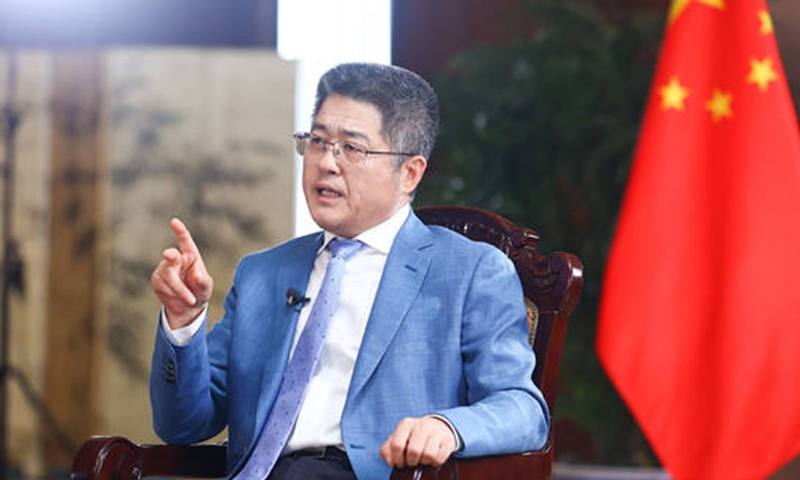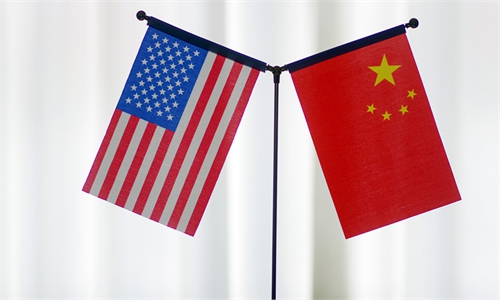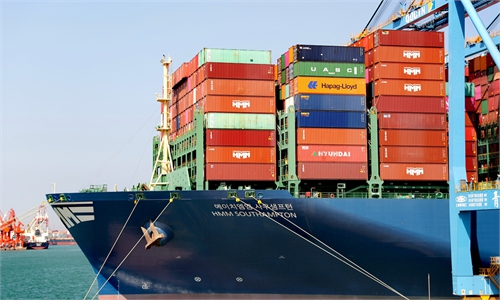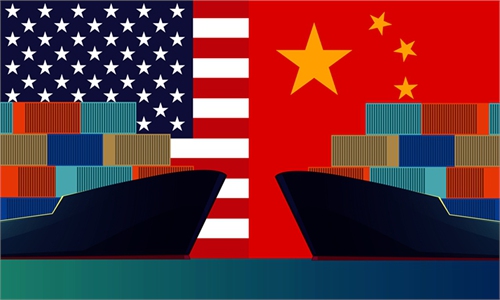
Chinese Vice Foreign Minister Le Yucheng Photo: guancha.cn
China and the US made another step forward in sending warm signals to each other, with Chinese Vice Foreign Minister Le Yucheng recently urging the US to "turn economic cooperation and trade into an ice breaker" in China-US relations, in what experts consider as a friendly response to the US Trade Representative's olive branch-extending remarks that China-US decoupling is unrealistic.
However, economists also called on the US to take practical measures to meet China's requirements on specific issues, namely, scrapping tariffs and sanctions on Chinese products and companies, so that the kind gestures could turn into actual progress.
In a recent interview with CGTN, Le said that China has noted some positive elements in US Trade Representative Katherine Tai's remarks, but firmly rejects her groundless accusations. He also stressed that China and the US are an indivisible community with shared interests, calling on the US to "truly change its course."
This is yet another sign of communication between top government officials of China and the US, though not as direct as people might have hoped, in recent days, after Chinese Vice Premier Liu He held a video call with Tai to discuss the two countries' trade relations.
"It's definitely a positive sign that China and the US are communicating and discussing their attitude toward each other, which I think is creating a friendly atmosphere for them to seek common interests," said Hu Qimu, chief research fellow at the Sinosteel Economic Research Institute.
China and the US are finally turning their faces to each other after they saw their trade and economic sectors closely intertwined and unbroken despite repeated blows from the outside, which was again reflected by the two countries' stable trade growth in the first three quarters, as shown by Customs data released on Wednesday.
Relying on Chinese market
According to data released by Chinese Customs on Wednesday, China's exports to the US increased 32.9 percent year-on-year to $412 billion in the first three quarters this year, down slightly from a 33.3 percent growth in the first eight months. China's imports from the US also grew 43.5 percent in the first three quarters, down from 48 percent in the first eight months.
The US is China's third largest trading partner, behind the EU and Association of Southeast Asian Nations (ASEAN) members in the first three quarters.
The China-US trade growth, which came despite a slew of negative factors such as the coronavirus-triggered transportation jam and global power crunch, showed the intertwining character of the world's two largest economies, which will drive global economic recovery, experts said.
"It shows that China and the US are deepening economic and trade connections, as well as getting back to normal track since President Joe Biden took office," Tian Yun, former vice director of the Beijing Economic Operation Association, told the Global Times on Wednesday.
Hu also called the recent China-US trade "stable" judging by the growth in the past three quarters, which he said attests to the fact that the US is highly dependent on China's manufacturing regardless of the US government's crackdown measures.
"With the coronavirus continuing to ravage the US and Southeast Asian nations, it's impossible for the US to get manufacturing back to its own country or to other regions from China. Its supplies must rely on China," Hu told the Global Times.
He also noted that even in the long term, the US' reliance on Chinese supplies is hard to be reversed, as they not only need low-cost imports to curb inflation, but are also not adapted to labor-intensive manufacturing industries without substantial fiscal subsidies.
Other data also reflects the attachment shown by US companies to China's markets. For example, a report by the American Chamber of Commerce (AmCham) in September showed that about 78 percent of the 338 respondents surveyed described themselves as either optimistic or slightly optimistic about the five-year business outlook in China, up 20 percentage points from 2020 and a return to the figures the world had witnessed before the most brittle days of the China-US trade war. Le mentioned the data in his interview.
In such a situation of mutual economic dependence, experts and businesspeople urged the US to look at China-US relations more from a win-win perspective, instead of adopting a Cold War mindset.
"Competitiveness is not achieved through sanctions or crackdowns, which will only hurt both countries," Hu said, stressing that the two countries should start cooperating by looking for their common interests, whether in fighting the coronavirus or cutting carbon emissions.
US should correct mistakes
However, experts also stressed that it's not enough for the US to merely send cooperative signals. They should take concrete action to meet China's requirements on scrapping the extra tariffs and US sanctions on Chinese companies. Otherwise, talks will not make substantial progress.
During Vice Premier Liu He's virtual meeting with Tai, he negotiated the cancellation of tariffs and US sanctions, according to a report of the Xinhua News Agency.
In recent talks with the US in China's Tianjin, China has put forward two lists to the US, one of which is the List of US Wrongdoings that Must Stop, such as stop suppressing Chinese enterprises. China also expressed serious concerns to the US on some key individual cases, such as Chinese diplomatic and consular missions being harassed and attacked in the US and growing anti-Asian and anti-China sentiment, in another list.
Dong Shaopeng, a senior research fellow at the Chongyang Institute for Financial Studies of Renmin University of China, stressed that it is important for the US to take action and respond to the two lists, while gradually lifting additional tariffs imposed on China to further promote bilateral communications.
"The US should not be obsessed with getting benefits from China, like forcing China to buy more of its products, while neglecting China's appeals in bilateral talks," he told the Global Times.
A manager surnamed Huang from Guangdong Eagle Gifts Company, a global supplier of holiday ornaments which will participate in the 130th Canton Fair, scheduled to kick off in Guangzhou on Friday, also said that the business cycle is calling for the US government to relax tariffs on Chinese goods.
"If the US liberalizes its tariff policy toward China or eases sanctions on Chinese products, it will bring more benefits to US consumers than the Chinese people, after the global supply chain has already been hit hard by the ongoing pandemic," he said.
Analysts said solving China-US disputes in tariffs can benefit the US economy by boosting their consumption sector.
Dong Dengxin, director of the Finance and Securities Institute of Wuhan University, said that since the US has rigid demands for Chinese goods, they have to continue to import from China with higher costs, as the extra tariffs imposed on Chinese goods are mostly paid by them, and eventually US consumers, instead of Chinese exporters.
"Since US economic growth is primarily driven by consumption, increasing purchasing costs would, to some extent, hurt the country's consumption sector, which in turn would drag down the country's economy," he said.
Although the US crackdown on Chinese tech firms would strike a blow to some Chinese companies, it would also hurt US upstream and downstream industries, while causing many US companies and their partners to lose market share, he said.
"Solving the tariffs disputes could lift US consumption and, in turn, their economy, while cooperation between high-tech companies also leads to win-win results," he said.
Le also cited a report from Moody's that the China-US trade war has cost the US around 300,000 jobs, while 90 percent of the costs caused by extra tariffs on Chinese imports have been borne by US consumers and companies.





